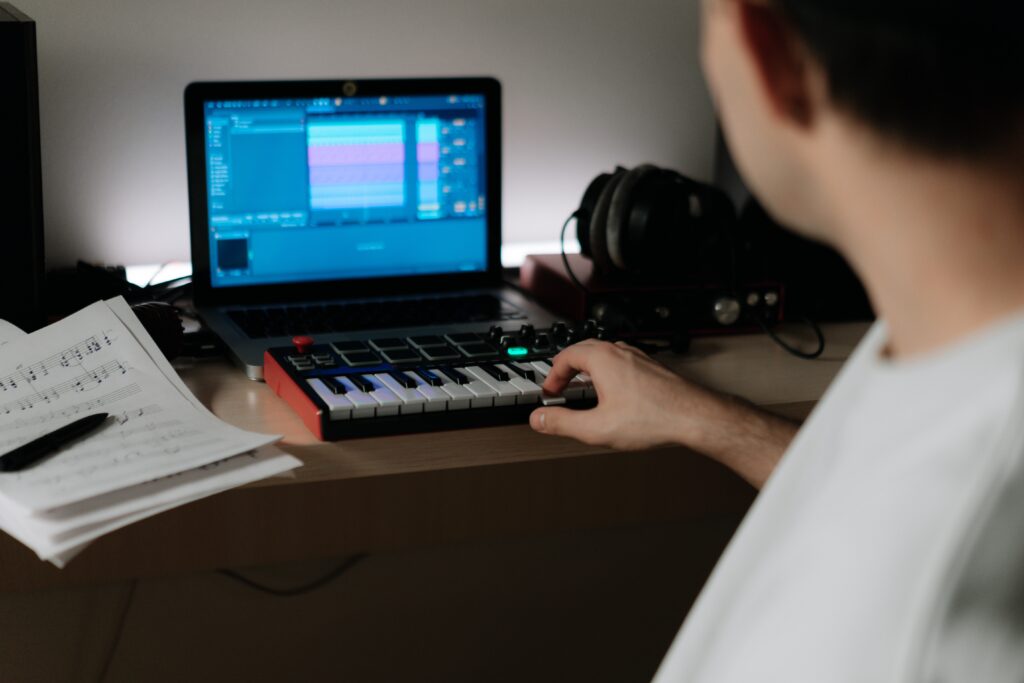What consists of creating your music?
Every musician has gone through various workflows in producing music. When starting it can be a bit overwhelming and can give you a huge pause in continuing your masterpiece. With consistent practice and experience, you can develop your technique and creative workflow.
This guide will give you an overview of what it takes to create a song from an idea to a radio-ready hit. The fundamental stages are listed in order of importance.
-
- Idea and Design
- Composition/Songwriting
- Arranging
- Tracking
- Editing
- Mixing
- Mastering
1. Idea and Design
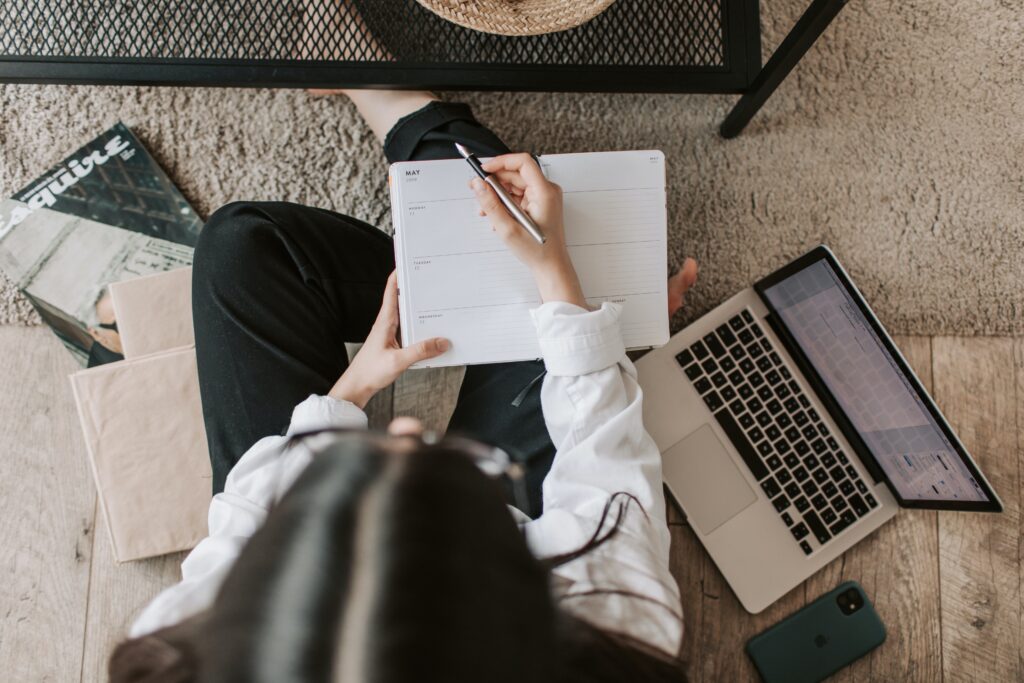
Yaaaaass! you are reading this post because you want to get your music finished and out for everyone to hear. You are exactly where you need to be.
This is probably one of the most important stages of all, but unfortunately, it’s most likely the most skipped. A lot of creatives don’t want technicality to stop them from their creation. It tends to be boring and too much of a“structural” process to go through especially when we have inspiration knocking at our front door.
Let’s be honest, inspiration isn’t always knocking at our door. Writer’s block tends to invite itself over for dinner sometimes and motivation couldn’t show up for band practice, again, ugh that mofo.
My point is LIFE can get in the way of your craft. Having your main ideas and goals jotted down can be handy to get you reenergized and focused on finishing your music.
Things to consider when designing your idea.
- Set Goals: Schedule the day you want to release your song and then work your way backward. Try to stay true and realistic to your deadlines. Leave in extra days just in case you need more time at a certain stage.
- Instruments: How many do you plan on using? Which instruments? You can always take and add away once you start composing, nothing is ever set in stone.
- Song Structure: This will also be in the arrangement stage of your songwriting process, but consider writing down ideas for your intro, verse, chorus, etc… Do you have a general song structure you like to follow, or did you want to experiment a bit? How many verses are in your song? How long will your intro be? Will you have an instrument solo?
- Tone: Music is so powerful it can change emotions in an instant. Think about how your favorite song makes you feel. Do you think the artist wanted you to feel that way? Now think about your song, what type of tone do you want your fans to feel?
- References: Look up images, movies, video games, songs, and places that inspire you to write this particular piece. This will also help you to develop the tone and narrative of your song
2.Composition/ Songwriting
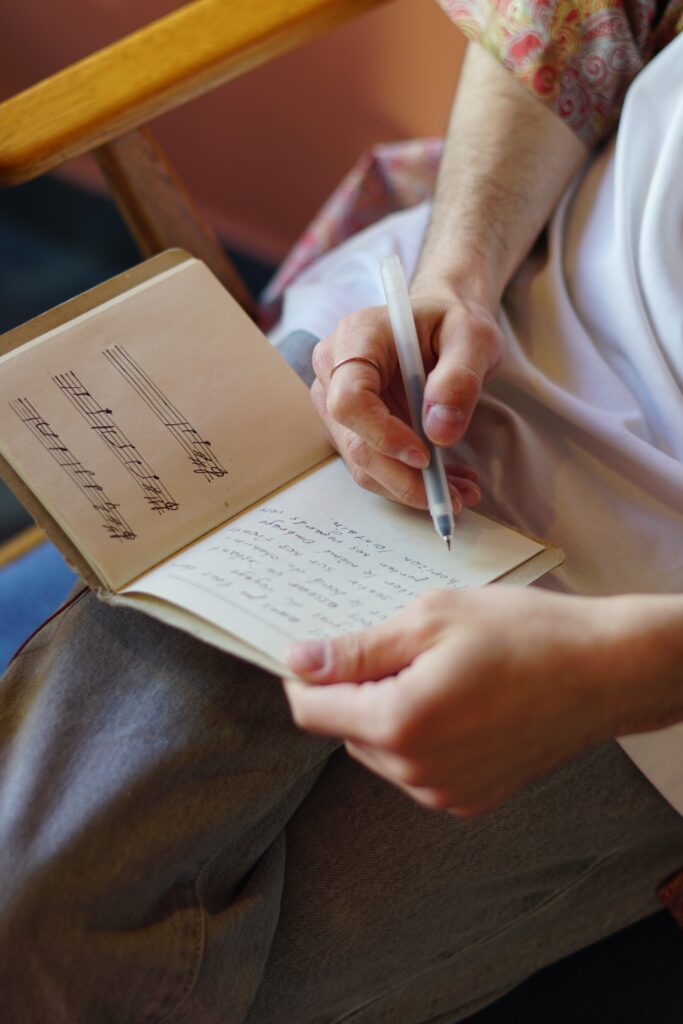
The songwriting stage is the most fun! I mean come on we love ideas being put on paper since it is living proof of who we are as musicians. Take the opportunity to experiment with your ideas in this stage, add in a rhythm or chord you’ve never used before. If you like it, awesome! If not, then take it out. Don’t be afraid to widen your musical ability at this stage.
Things to consider:
-
- Figure out the Tempo, Time-Signature, and Key. Make this a habit especially, if you are writing music for film, tv, or video games. Knowing the tempo, time signature(s), and key ahead of time can save you time and keep you focused on your composition.
- Decide which Chord Progressions best suit the tone of your song.
- start with a basic Beat to keep you in tempo
- Add in various types of Harmonies, Counter Melodies, Rhythms, etc… to give your music color
- Add in several instruments to widen the texture of your song
- Get more in-depth with your drumbeat, if your song requires it.
- A little sound design is always an extra touch to your musical story
Last but not least, have a deep and focused workflow.
What keeps you focused and undistracted? We live in a world where- SQUIRREL!!………. Anyways, we live in a world where distraction and procrastination prevent us from deep focus. If having your phone tempts you to look at social media every 30 seconds, see if you can keep it in another room for at least 10 minutes. This habit will keep you from procrastinating on your phone.
The following stage can intertwine with the composing stage so no harm is done if you’ve been working on the next step simultaneously.
3. Arranging/Editing
Assembling your song structure is important for your listeners to stay connected with your music and keep them coming back for more. Layering out your song on paper or marking it through your DAW can give you an overview of how you prefer to structure your music. Keep it as a template for future songs for a quicker start.
- Take away any unnecessary or overwhelming musical parts. You might have liked something at one point but then realize it just doesn’t fit the tone of your song.
- Figure out if you need to fill in an empty or lonely space.
- Make sure your transitions are smooth.
- Adjust the dynamics and velocity of the song if need be.
- Check for repetitions and anything that can distract your listeners
Also, consider playing or sending lyrics to a friend, mentor, or someone who likes the genre of your music. You will be able to find out what people like and don’t like, early on and make changes before finalizing your song.
Putting yourself to receive feedback is the right way to go in developing your skills. Don’t be upset if someone doesn’t like your song. The whole point of showing someone is to give you an idea of what you need to work on, not to give yourself praise.
4. Tracking
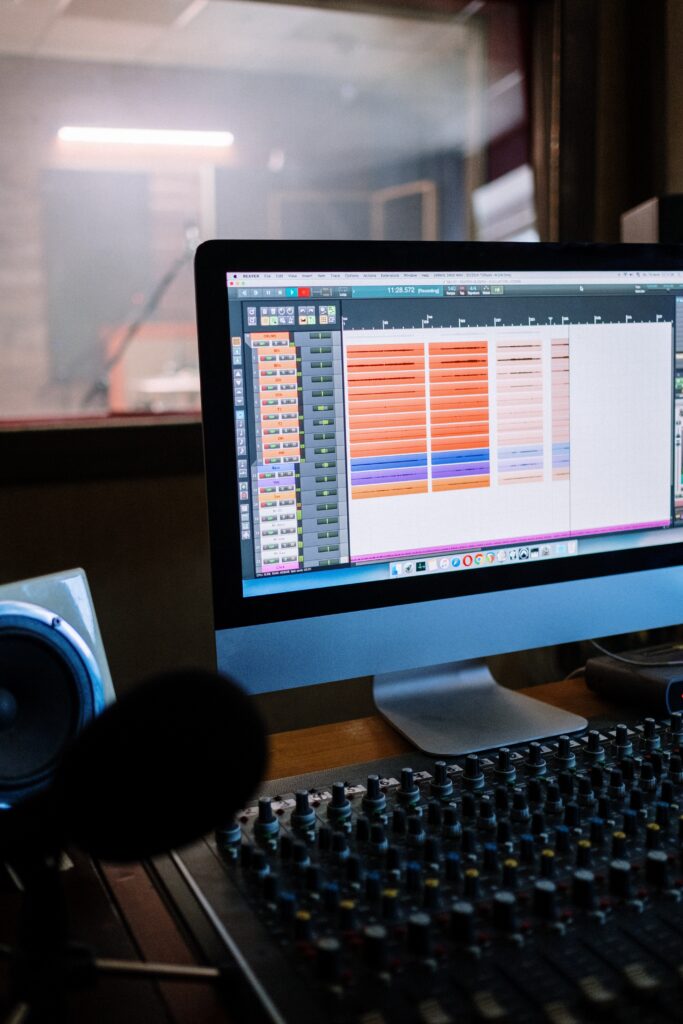
Ahh yes, recording time baby! It’s getting real. Unless you have been writing music using midi, tracking your music correctly and smoothly is vital for the following stages.
For the songwriters out there transferring paper or acoustic sound to a DAW, consider this process to be the second most important part of having a radio-ready hit. Every musician wants their music to sound similar to or even better than what they have imagined in their brains. The tracking stage can hurt you down the road if you don’t take this part seriously.
If you don’t have access to a studio or are considering building your own home studio. Check out my Beginner Home Studio Equipment Guide. It’ll give you an idea of what you need to start recording your music at home.
- Demo- If you haven’t already, track out a simple and easy demo to give to your bandmates. This will help them practice their parts in their own time. You might end up finding out you need to take a step back and change a few things. That’s okay, just don’t keep going back and prevent yourself from finishing your song.
- Rehearse-Please, please, pleaaaaaase. Rehearse before your final recording. PLEASE. I don’t care how talented you are. REHEARSE BEFORE YOUR FINAL RECORDING. You will be saving yourself and everyone else time and money! Rehearse your music with your bandmates as well so you guys can find your chemistry during practice and not during the final recording.
- Final recording session- Did you practice? Because this is it! Whatever you capture here, the audio engineer will be in charge of editing, mixing, and mastering the final tracks.
Consider creating a schedule if you are recording more than one song or planning to record the instruments separately. If you are recording each instrument separately, bring your demo with you to the recording studio so you’ll have a reference to listen back to.
5.Editing
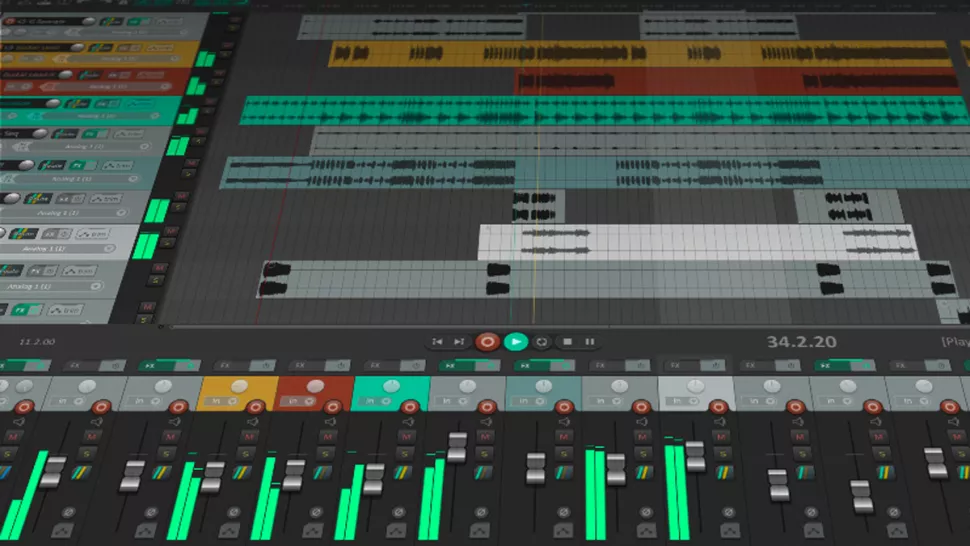
After recording, the audio engineer will prepare and clean up the stems and put everything together in the right place for a proper mix.
If you are doing this yourself, editing your stems consists of a few things:
- Adjusting and Slicing
- Removing clicks or pops
- Cutting out empty audio clips
- Adding fades to stems or audio clips
- Anything that will cause a distraction during the mixing stage
- Multing
- This is where you split different parts of a stem to different tracks in your daw to add a variety of faders or effects for a more colorful mix.
- Timing/Tuning
- Use Quantization to help with timing your tracks
- Modifying your vocals can make your song sweeter for your listeners. Using a form of autotune or tuning plugin can adjust sharps or flats in vocals, guitars, woodwinds, etc…
6.Mixing
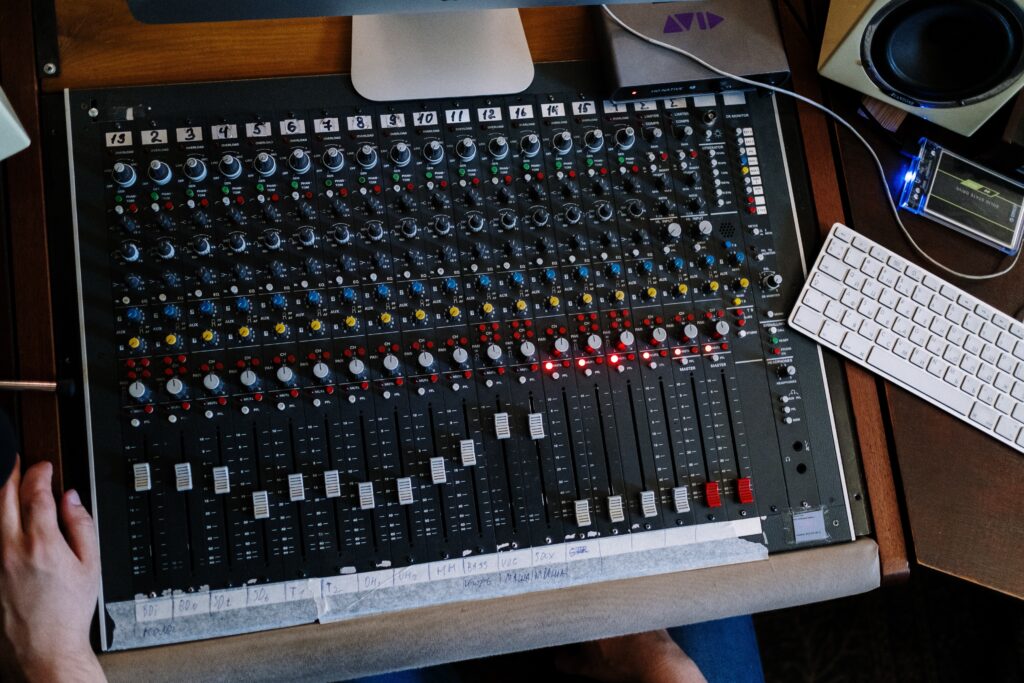
The whole point of mixing is to combine all recorded tracks into one balanced and richer sound. Understanding the fundamentals of mixing is essential to acquire when mixing music.
It is preferred to have someone else mix your music, but doing it yourself can also boost your musical and audio-engineering abilities. It’ll open up your ear to the frequency spectrum, and give you a creative boost in all things music.
I won’t go into greater detail, but here is the order you should take for beginner mixers.
- STATIC MIX
- balancing all volume levels evenly
- Panning left and right to create space for other frequencies
- EQ
- Taking out unnecessary noise in tracks
- Make certain frequencies the main focus or have them pop out more than other frequencies
- Shape the sound of a track
- COMPRESSION
- Leveling out soundwaves in a track
- Gives your audio clip color and warmth
- EFFECTS
- Manipulating your tracks by adding reverb, delay, and/or extra spatial panning
- AUTOMATION
- Helps with the dynamics of your music
7. Mastering
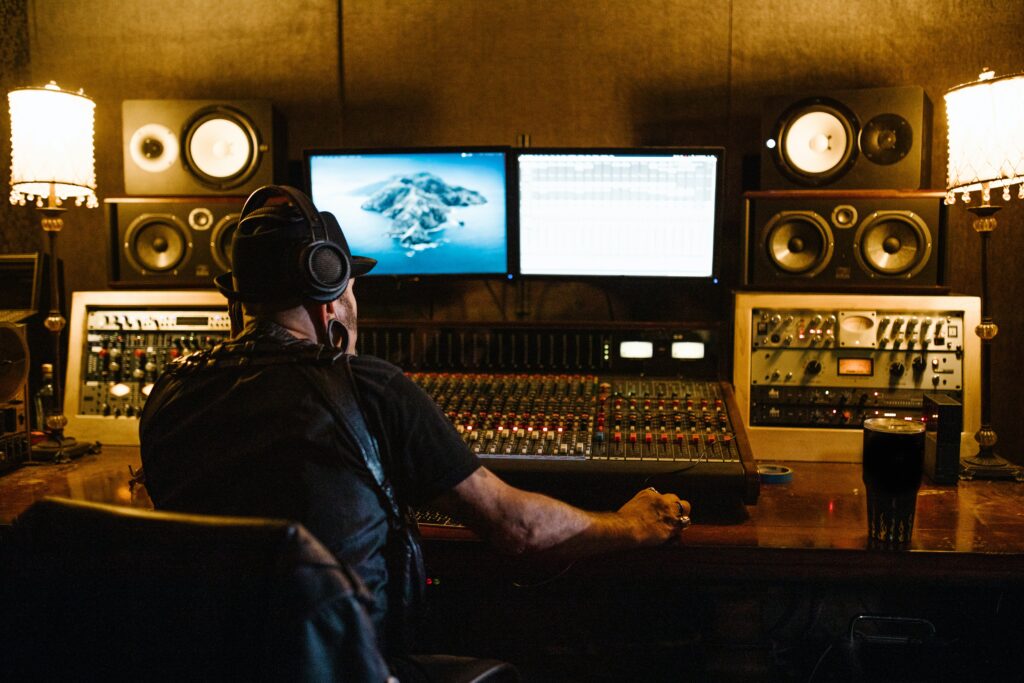
If your audio engineer did a great job leveling your sound, you probably won’t need a mastering session. The purpose of mastering is to prepare your song for playback optimization across all monitoring systems and commercial loudness. Mastering is another art in itself. It Uses equalization, compression, saturation, stereo enhancement, and more to bring your track into the proper media format.
Conclusion
Don’t be discouraged if the process of producing and releasing your song is overwhelming. If any of these stages are keeping you from focusing on your songwriting, consider collaborating with someone. They might have the skills you need thus saving you time to focus on your craft and continue releasing music for everyone to hear.
